Charles E W Bean, Diaries, AWM38 3DRL 606/255/1 - 1916 - 1937 - Part 5
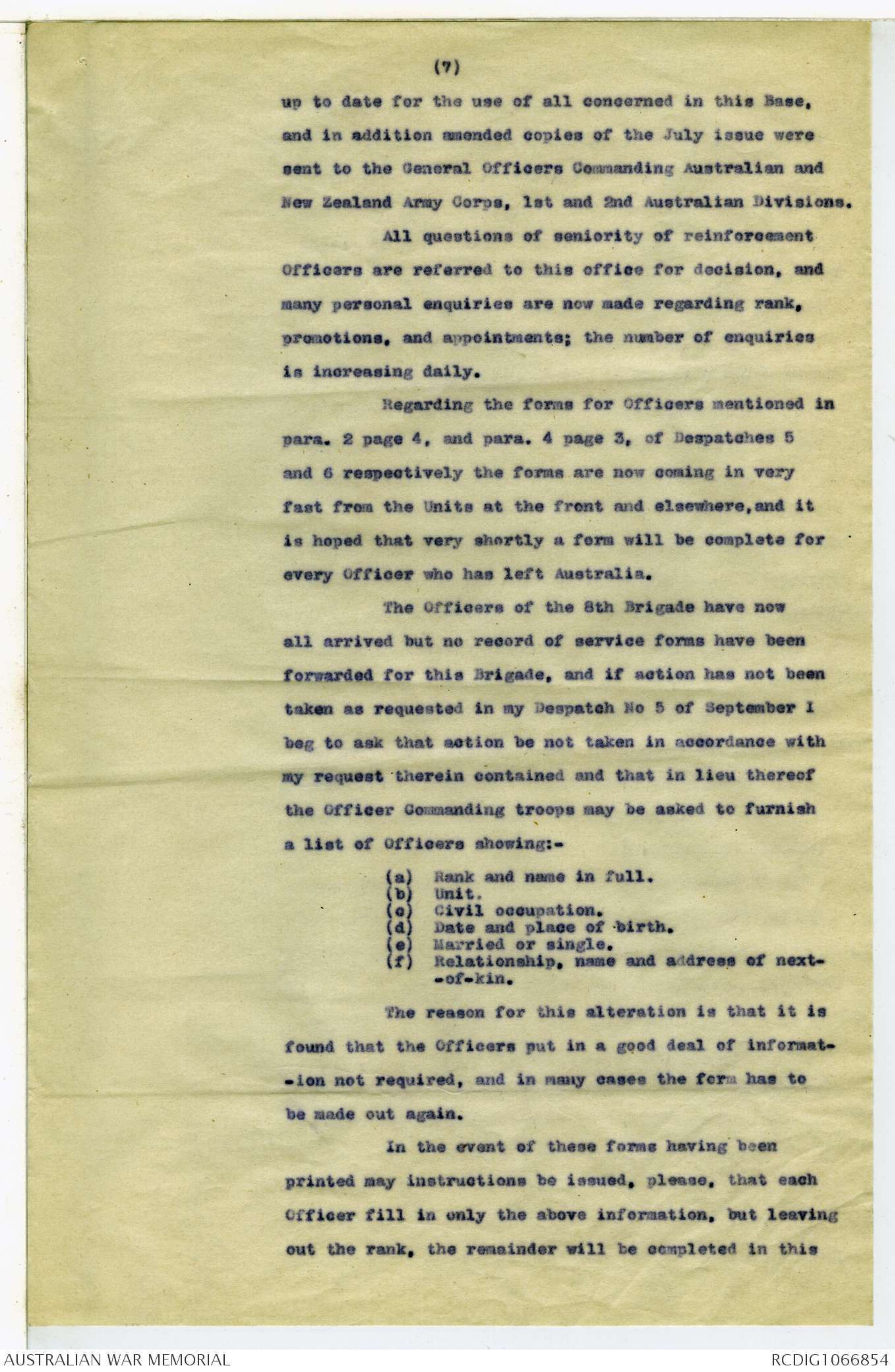
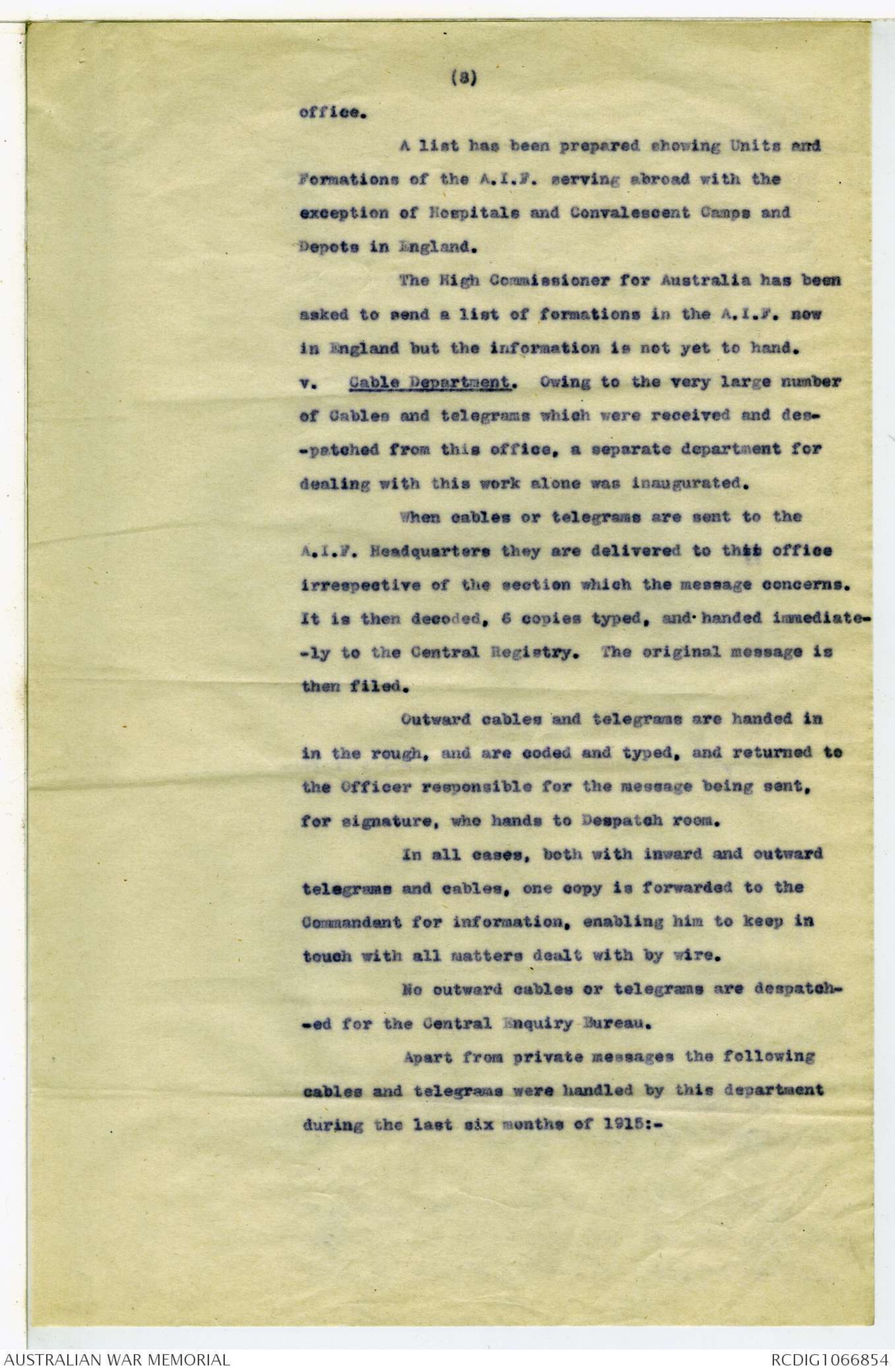
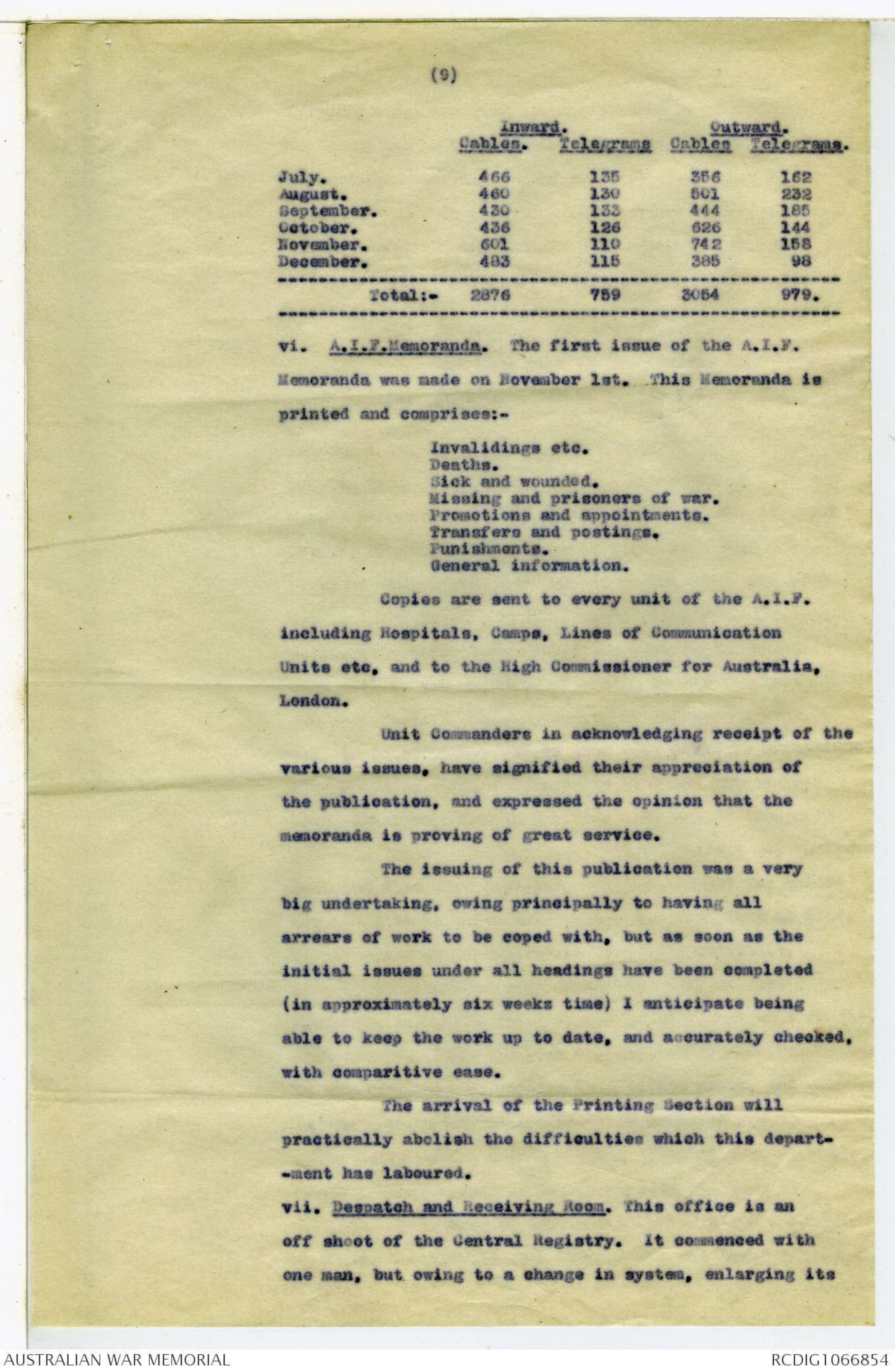
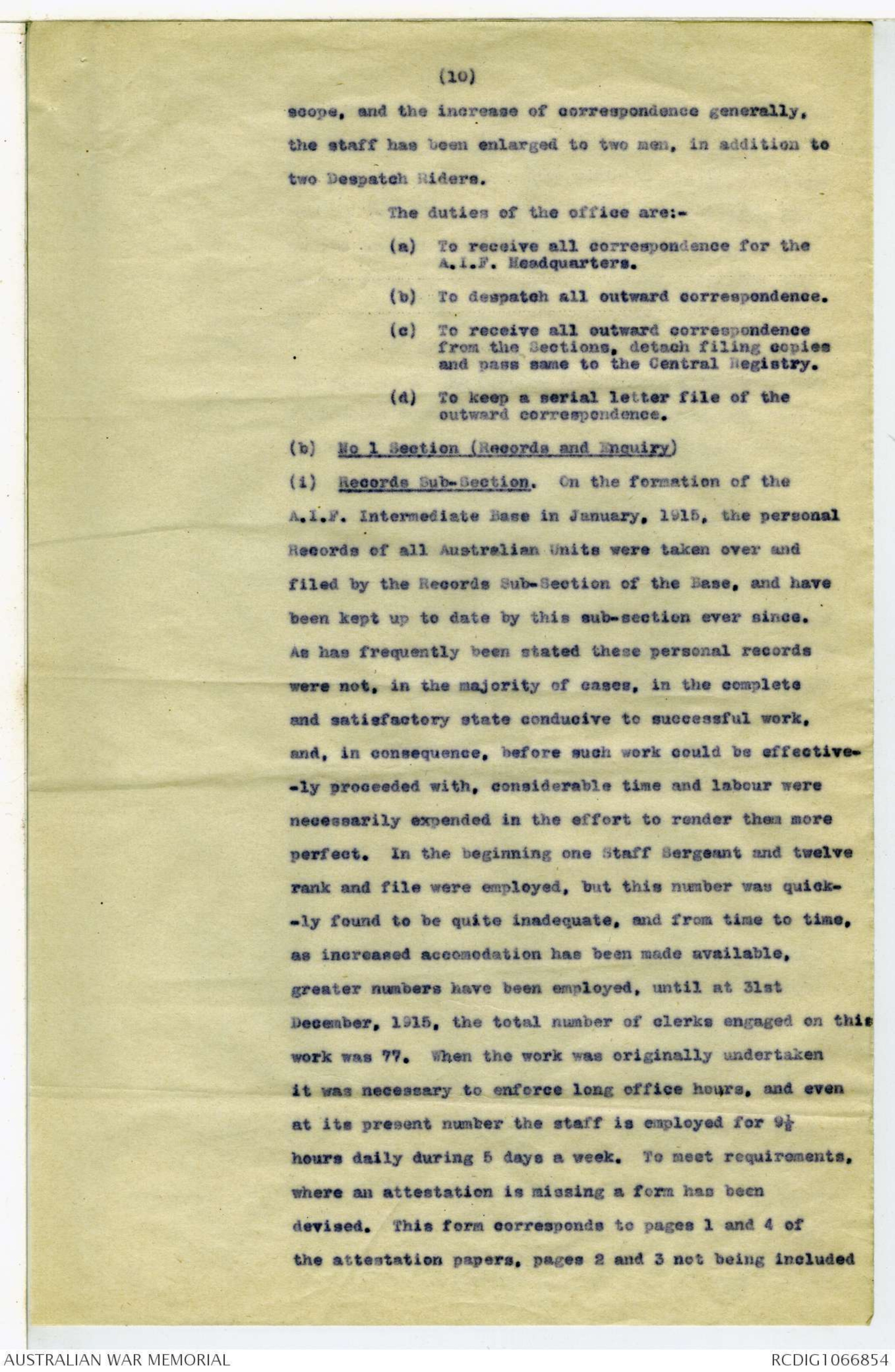
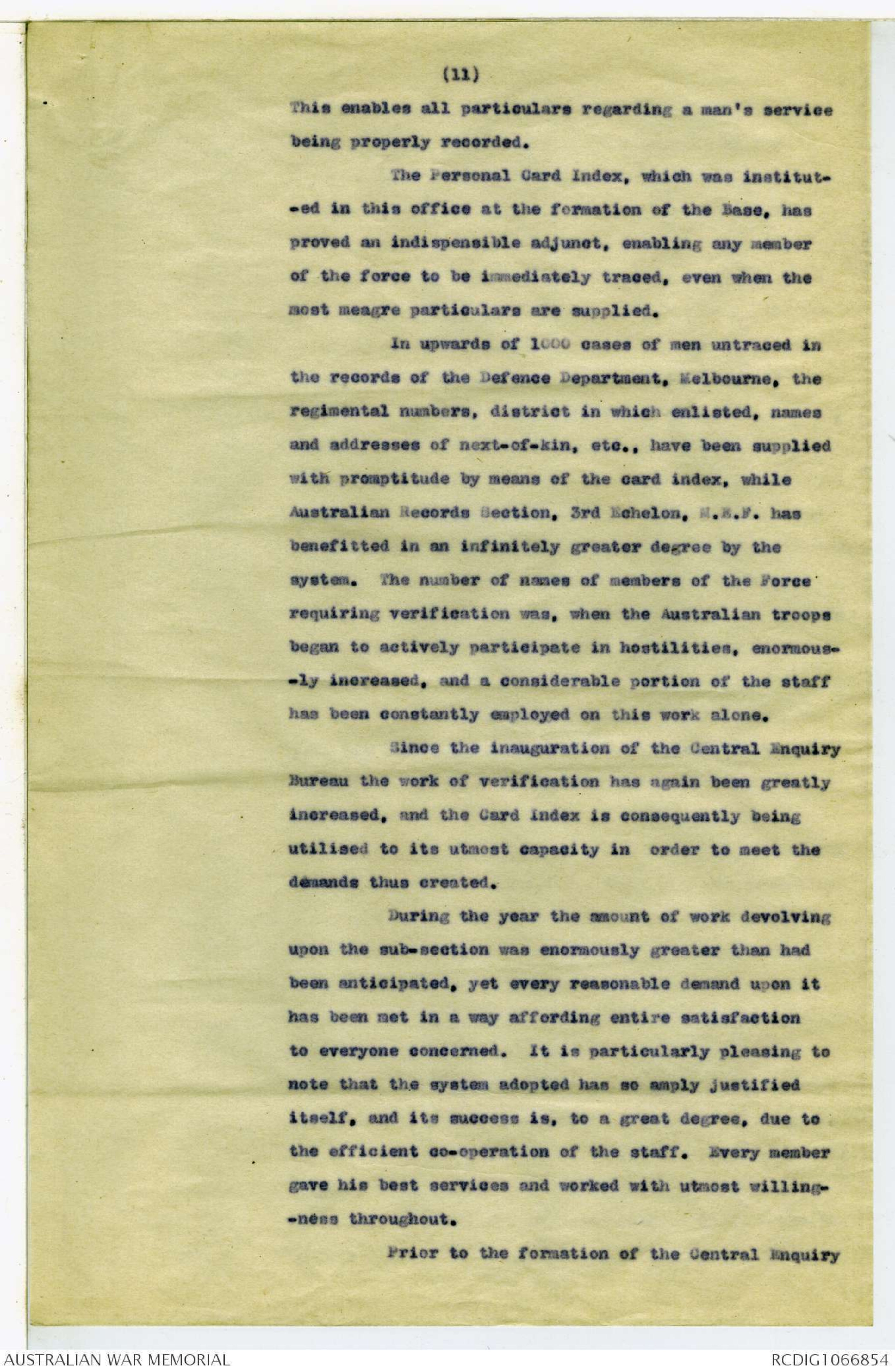
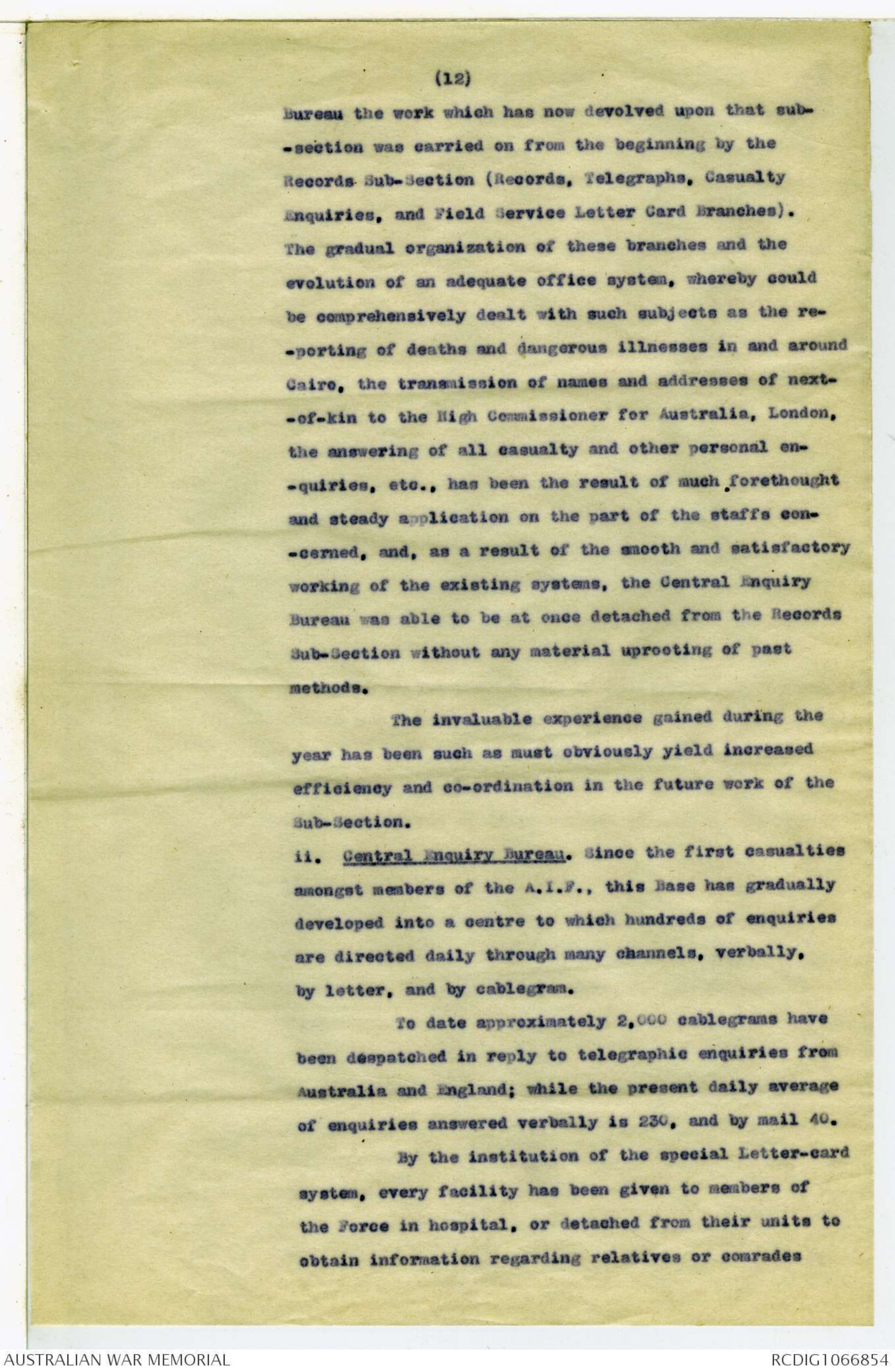
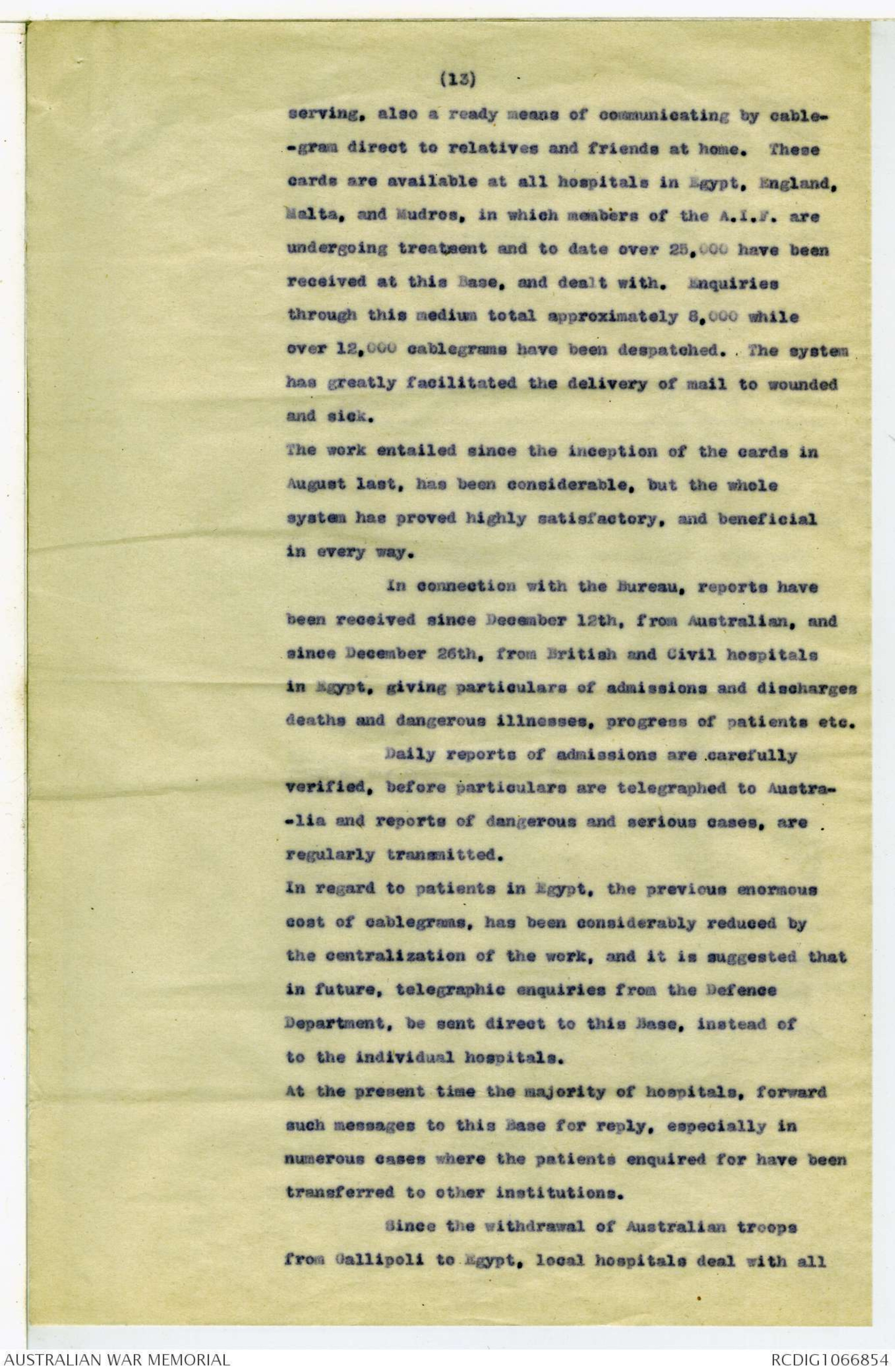
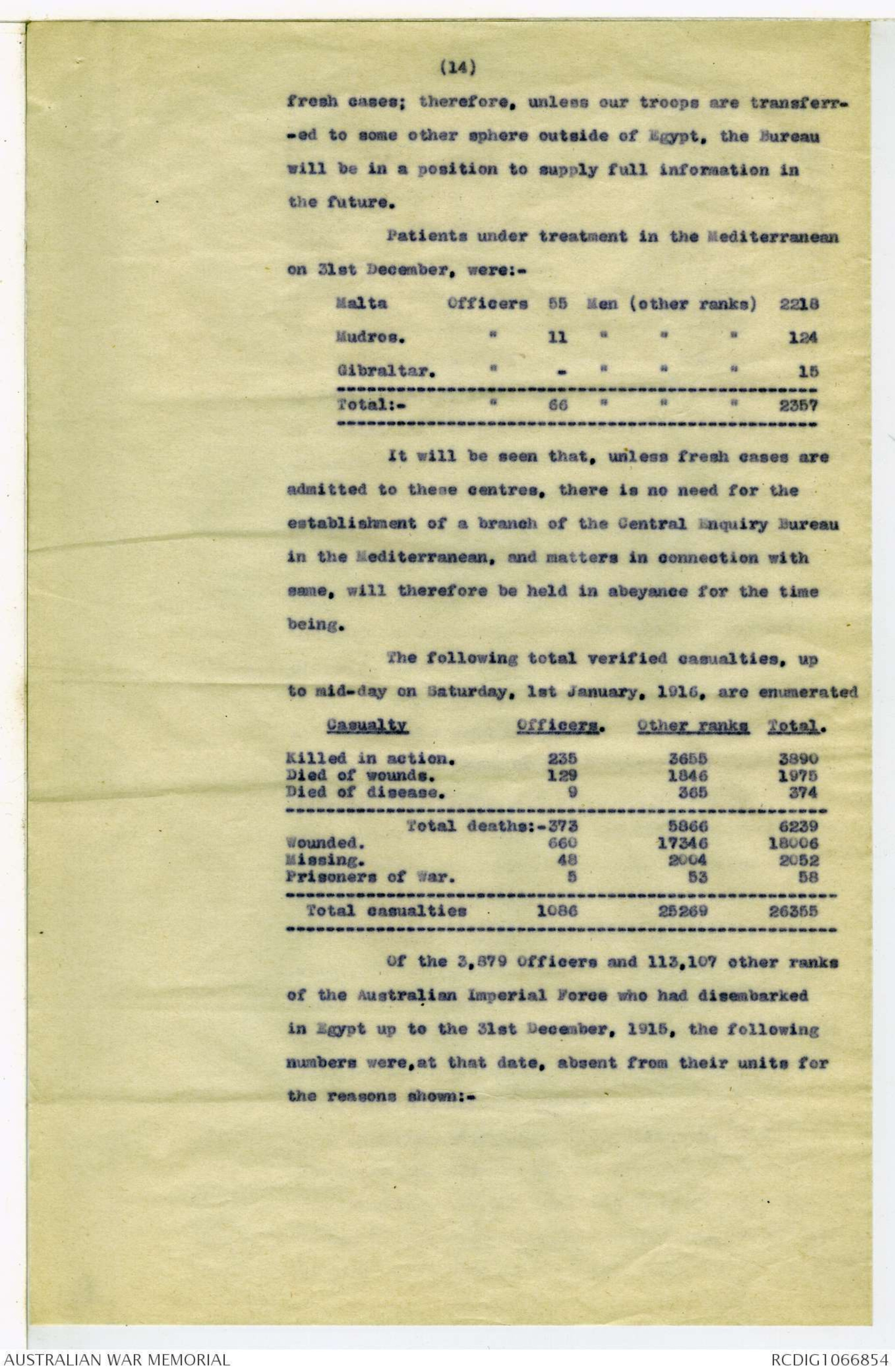
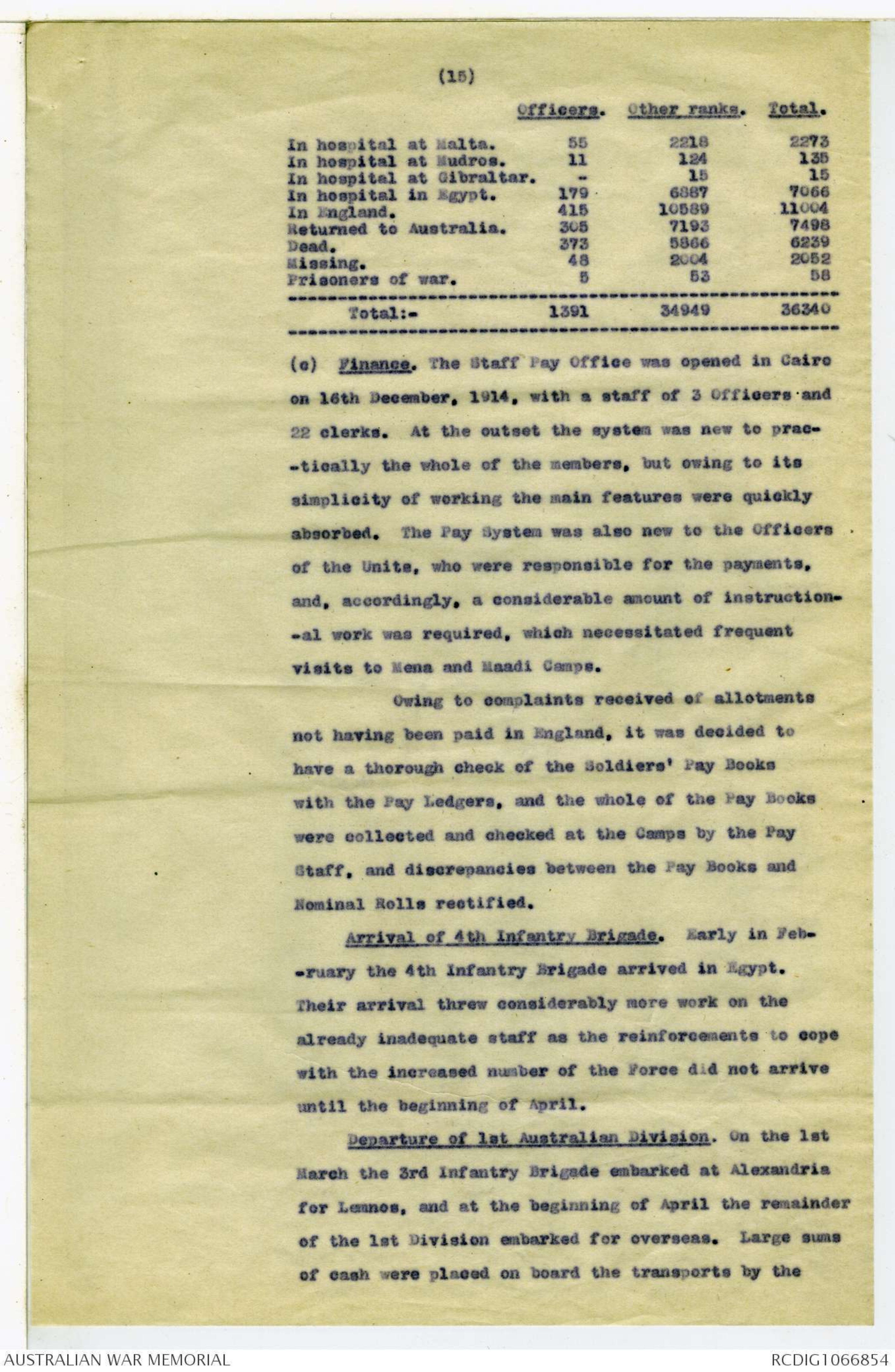
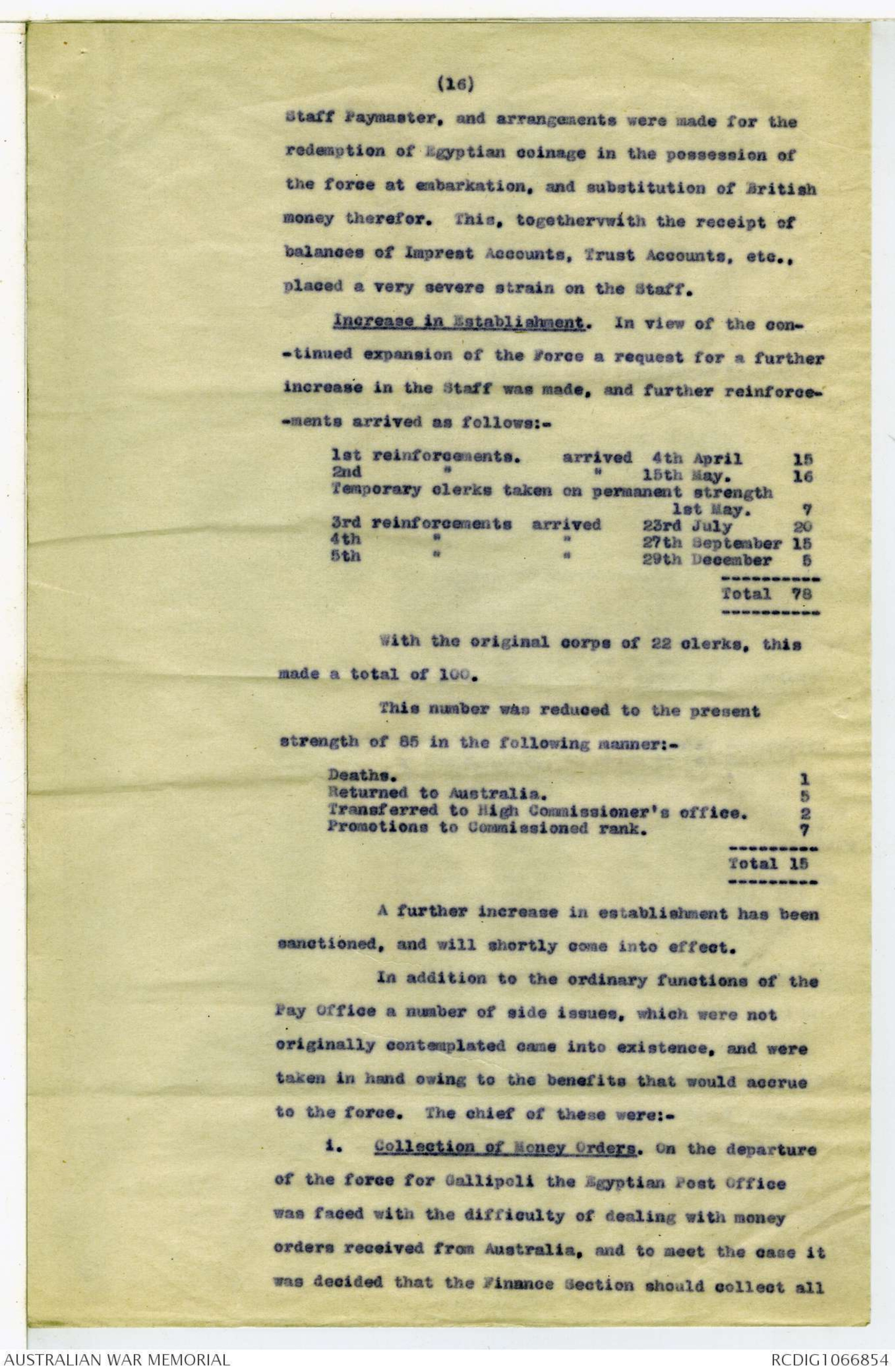
(7)
up to date for the use of all concerned in this Base,
and in addition amended copies of the July issue were
sent to the Ceneral Officers Commanding Australian and
New Zealand Army Corps, 1st and 2nd Australian Divisions.
All questions of seniority of reinforcement
Officers are referred to this office for decision, and
many personal enquiries are now made regarding rank,
promotions, and appointments; the number of enquiries
is increasing daily.
Regarding the forms for Officers mentioned in
para. 2 page 4, and para. 4 page 3, of Despatches 5
and 6 respectively the forms are now coming in very
fast from the Units at the front and elsewhere, and it
is hoped that very shortly a form will be complete for
every Officer who has left Australia.
The Officers of the 8th Brigade have now
all arrived but no record of service forms have been
forwarded for this Brigade, and if action has not been
taken as requested in my Despatch No 5 of September I
beg to ask that action be not taken in accordance with
my request therein contained and that in lieu thereof
the Officer Commanding troops may be asked to furnish
a list of Officers showing:-
(a) Rank and name in full.
(b) Unit.
(c) Civil occupation.
(d) Date and place of birth.
(e) Married or single.
(f) Relationship, name and address of next-of-kin.
The reason for this alteration is that it is
found that the Officers put in a good deal of information
not required, and in many cases the form has to
be made out again.
In the event of these forms having been
printed may instructions be issued, please, that each
officer fill in only the above information, but leaving
out the rank, the remainder will be completed in this
(8)
office.
A list has been prepared chowing Units and
Formations of the A.I.F. serving abroad with the
exception of Hospitals and Convalescent Camps and
Depots in England.
The High Commissioner for Australia has been
asked to send a list of formations in the A.l.F. now
in England but the infornation is not yet to hand.
v. Cable Department. Owing to the very large number
of Cables and telegrams which were received and despatched
from this office, a separate department for
dealing with this work alone was inaugurated.
When cables or telegrams are sent to the
A.I.F. Headquarters they are delivered to this office
irrespective of the section which the message concerns.
It is then decoded, 6 copies typed, and handed immediately
to the Central Registry. The original message is
then filed.
Outward cables and telegrams are handed in
in the rough, and are coded and typed, and returned to
the Officer responsible for the message being sent,
for signature, who hands to Despatch room.
In all cases, both with inward and outward
telegrams and cables, one copy is forwarded to the
Commandant for information, enabling him to keep in
touch with all matters dealt with by wire.
No outward cables or telegrams are despatched
for the Central Enquiry Bureau.
Apart from private messages the following
cables and telegrams were handled by this department
during the last six monthe of 1915:-
(9)
| Inward. | Outward. | ||||
| Cables. | Telegrams | Cables | Telegrams. | ||
| July. | 466 | 135 | 356 | 162 | |
| August. | 460 | 130 | 501 | 232 | |
| September. | 430 | 133 | 444 | 185 | |
| October. | 436 | 126 | 626 | 144 | |
| November. | 601 | 110 | 742 | 158 | |
| December. | 483 | 115 | 385 | 98 | |
| Total:- | 2876 | 759 | 3054 | 979. | |
vi. A.I.F. Memoranda. The first issue of the A.I.F.
Memoranda was made on November 1st. This Memoranda is
printed and comprises:-
Invalidings etc.
Deaths.
Sick and wounded.
Missing and prisoners of war.
Promotions and appointments.
Transfers and postings.
Punishments.
General information.
Copies are sent to every unit of the A.l.F.
including Hospitals, Camps, Lines of Communication
Units etc. and to the High Commissioner for Australia,
London.
Unit Commanders in acknowledging receipt of the
various issues, have signified their appreciation of
the publication, and expressed the opinion that the
memoranda is proving of great service.
The issuing of this publication was a very
big undertaking, owing principally to having all
arrears of work to be coped with, but as soon as the
initial issues under all headings have been completed
(in approximately six weeks time) I anticipate being
able to keep the work up to date, and accurately checked,
with comparitive ease.
The arrival of the Printing Section will
practically abolish the difficulties which this department
has laboured.
vii. Despatch and Receiving Room. This office is an
off shoot of the Central Registry. It commenced with
one man, but owing to a change in system, enlarging its
(10)
scope, and the increase of correspondence generally,
the staff has been enlarged to two men, in addition to
two Despatch Riders.
The duties of the office are:-
(a) To receive all correspondence for the
A.I.F. Headquarters.
(b) To despatch all outward correspondence.
(c) To receive all outward correspondence
from the Sections, detach filing copies
and pass same to the Central Registry.
(d) To keep a serial letter file of the
outward correspondence.
(b) No 1 Section (Recorde and Inquiry)
(i) Records Sub-Section. On the formation of the
A.I.F. Intermediate Base in January, 1915, the personal
Records of all Australian Units were taken over and
filed by the Records Sub-Section of the Base, and have
been kept up to date by this sub-section ever since.
As has frequently been stated these personal records
were not, in the majority of cases, in the complete
and satisfactory state conducive to successful work,
and, in consequence, before such work could be effectively
proceeded with, considerable time and labour were
necessarily expended in the effort to render them more
perfect. In the beginning one Staff Sergeant and twelve
rank and file were employed, but this number was quickly
found to be quite inadequate, and from time to time,
as increased accomodation has been made available,
greater numbers have been employed, until at 31st
December, 1915, the total number of clerks engaged on this
work was 77. When the work was originally undertaken
it was necessary to enforce long office hours, and even
at its present number the staff is employed for 9 1/2
hours daily during 5 days a week. To meet requirements,
where an attestation is missing a form has been
devised. This form corresponds to pages 1 and 4 of
the attestation papers, pages 2 and 3 not being included
(11)
This enables all particulars regarding a man's service
being properly recorded.
The Personal Card Index, which was instituted
in this office at the formation of the Base, has
proved an indispensible adjunct, enabling any member
of the force to be immediately traced, even when the
most meagre particulars are supplied.
In upwards of 1000 cases of men untraced in
the records of the Defence Department, Melbourne, the
regimental numbers, district in which enlisted, names
and addresses of next-of-kin, etc., have been supplied
with promptitude by means of the card index, while
Australian Records Section, 3rd Echelon, M.E.F. has
benefitted in an infinitely greater degree by the
system. The number of names of members of the Force
requiring verification was, when the Australian troops
began to actively participate in hostilities, enormously
increased, and a considerable portion of the staff
has been constantly employed on this work alone.
Since the inauguration of the Central Enquiry
Bureau the work of verification has again been greatly
increased, and the Card Index is consequently being
utilised to its utmost capacity in order to meet the
demands thus created.
During the year the amount of work devolving
upon the sub-section was enormously greater than had
been anticipated, yet every reasonable demand upon it
has been met in a way affording entire satisfaction
to everyone concerned. It is particularly pleasing to
note that the system adopted has so amply justified
itself, and its success is, to a great degree, due to
the efficient co-operation of the staff. Every member
gave his best services and worked with utmost willingness
throughout.
Prior to the formation of the Central Enquiry
(12)
Bureau the work which has now devolved upon that subsection
was carried on from the beginning by the
Records Sub-Section (Records, Telegraphs, Casualty
Enquiries, and Field Service Letter Card Branches).
The gradual organization of these branches and the
evolution of an adequate office system, whereby could
be comprehensively dealt with such subjects as the reporting
of deaths and dangerous illnesses in and around
Cairo, the transmission of names and addresses of next-of-kin
to the High Commissioner for Australia, London,
the answering of all casualty and other personal enquiries,
etc., has been the result of much forethought
and steady application on the part of the staffs concerned,
and, as a result of the smooth and satisfactory
working of the existing systems, the Central Enquiry
Bureau was able to be at once detached from the Records
Sub-Section without any material uprooting of past
methods.
The invaluable experience gained during the
year has been such as must obviously yield increased
efficiency and co-ordination in the future work of the
Sub-Section.
ii. Central Enquiry Bureau. Since the first casualties
amongst members of the A.I.F., this Base has gradually
developed into a centre to which hundreds of enquiries
are directed daily through many channels, verbally,
by letter, and by cablegram.
To date approximately 2,000 cablegrams have
been despatched in reply to telegraphic enquiries from
Australia and England; while the present daily average
of enquiries answered verbally is 230, and by mail 40.
By the institution of the special Letter-card
system, every facility has been given to members of
the Force in hospital, or detached from their units to
obtain information regarding relatives or comrades
(13)
serving, also a ready means of communicating by cablegram
direct to relatives and friends at home. These
cards are available at all hospitals in Egypt, England,
Malta, and Mudros, in which members of the A.I.F. are
undergoing treatment and to date over 25,000 have been
received at this Base, and dealt with. Enquiries
through this medium total approximately 8,000 while
over 12,000 cablegrams have been despatched. The system
has greatly facilitated the delivery of mail to wounded
and sick.
The work entailed since the inception of the cards in
August last, has been considerable, but the whole
system has proved highly satisfactory, and beneficial
in every way.
In connection with the Bureau, reports have
been received since December 12th, from Australian, and
since December 26th, from British and Civil hospitals
in Egypt. giving particulars of admissions and discharges
deaths and dangerous illnesses, progress of patients etc.
Daily reports of admissions are carefully
verified, before particulars are telegraphed to Australia
and reports of dangerous and serious cases, are
regularly transmitted.
In regard to patients in Egypt, the previous enormous
cost of cablegrams, has been considerably reduced by
the centralization of the work, and it is suggested that
in future, telegraphic enquiries from the Defence
Department, be sent direct to this Base, instead of
to the individual hospitals.
At the present time the majority of hospitals, forward
such messages to this Base for reply, especially in
numerous cases where the patients enquired for have been
transferred to other institutions.
Since the withdrawal of Australian troops
from Gallipoli to Egypt, local hospitals deal with all
(14)
fresh cases; therefore, unless our troops are transferred
to some other sphere outside of Egypt, the Bureau
will be in a position to supply full information in
the future.
Patients under treatment in the Mediterranean
on 31st December, were:-
| Malta | Officers | 55 | Men | (other ranks) | 2218 | |
| Mudros | " | 11 | " | " | " | 124 |
| Gibraltar | " | - | " | " | " | 15 |
| Total:- | " | 66 | " | " | " | 2357 |
It will be seen that, unless fresh cases are
admitted to these centres, there is no need for the
establishment of a branch of the Central Enquiry Bureau
in the Mediterrancan, and matters in connection with
same, will therefore be held in abeyance for the time
being.
The following total verified casualties, up
to mid-day on Saturday, 1st January, 1916, are enumerated
| Casualty | Officers. | Other ranks | Total. | |
| Killed in action. | 235 | 3655 | 3890 | |
| Died of wounds. | 129 | 1846 | 1975 | |
| Died of disease. | 9 | 365 | 374 | |
| Total deaths:- | 373 | 5866 | 6239 | |
| Wounded. | 660 | 17346 | 18006 | |
| Missing. | 48 | 2004 | 2052 | |
| Prisoners of War. | 5 | 53 | 58 | |
| Total casualties | 1086 | 25269 | 26355 | |
Of the 3,879 Officers and 113,107 other ranks
of the Australian Imperial Force who had disembarked
in Egypt up to the 31st December, 1915, the following
numbers were, at that date, absent from their units for
the reasons shown:-
(15)
| Officers. | Other ranks. | Total. | |
| In hospital at Malta. | 55 | 2218 | 2273 |
| In hospital at Mudros. | 11 | 124 | 135 |
| In hospital at Gibraltar. | - | 15 | 15 |
| In hospital in Egypt. | 179 | 6887 | 7006 |
| In England. | 415 | 10589 | 11004 |
| Returned to Australia. | 305 | 7193 | 7498 |
| Dead. | 373 | 5866 | 6239 |
| Missing. | 48 | 2004 | 2052 |
| Prisoners of war. | 5 | 53 | 58 |
| Total:- | 1391 | 34949 | 36340 |
(c) Finance. The Staff Pay Office was opened in Cairo
on 10th December, 1914, with a staff of 3 Officers and
22 clerks. At the outset the system was new to practically
the whole of the members, but owing to its
simplicity of working the main features were quickly
absorbed. The Pay System was also new to the Officers
of the Units, who were responsible for the payments,
and, accordingly, a considerable amount of instructional
work was required, which necessitated frequent
visits to Mena and Maadi Camps.
Owing to complaints received of allotments
not having been paid in England, it was decided to
have a thorough check of the Soldiers' Pay Books
with the Pay Ledgers, and the whole of the Pay Books
were collected and checked at the Camps by the Pay
Staff, and discrepancies between the Pay Books and
Nominal Rolls rectified.
Arrival of 4th Infantry Brigade. Early in February
the 4th Infantry Brigade arrived in Egypt.
Their arrival threw considerably more work on the
already inadequate staff as the reinforcemente to cope
with the increased number of the Force did not arrive
until the beginning of April.
Departure of 1st Australian Division. On the 1st
March the 3rd Infantry Brigade embarked at Alexandria
for Lemnos, and at the beginning of April the remainder
of the 1st Division embarked for overseas. Large sums
of cash were placed on board the transports by the
(16)
Staff Paymaster, and arrangements were made for the
redemption of Egyptian coinage in the possession of
the force at embarkation, and substitution of British
money therefor. This, togethervwith the receipt of
balances of Imprest Accounts, Trust Accounts, etc.,
placed a very severe strain on the Staff.
Increase in Establishment. In view of the continued
expansion of the Force a request for a further
increase in the Staff was made, and further reinforcements
arrived as follows:-
| 1st | reinforcements. | arrived | 4th | April | 15 |
| 2nd | " | " | 15th | May | 16 |
| Temporary clerks taken on permanent strength | |||||
| 1st | May. | 7 | |||
| 3rd | reinforcements | arrived | 23rd | July | 20 |
| 4th | " | " | 27th | September | 15 |
| 5th | " | " | 29th | December | 5 |
| Total | 78 | ||||
with the original corps of 22 clerks, this
made a total of 100.
This number was reduced to the present
strength of 85 in the following manner:-
| Deaths. | 1 | |
| Returned to Australia. | 5 | |
| Transferred to High Commissioner's office. | 2 | |
| Promotions to Commissioned rank. | 7 | |
| Total | 15 |
A further increase in establishment has been
sanctioned, and will shortly come into effect.
In addition to the ordinary functions of the
Pay Office a number of side issues, which were not
originally contemplated came into existence, and were
taken in hand owing to the benefits that would accrue
to the force. The chief of these were:-
i. Collection of Money Orders. On the departure
of the force for Gallipoli the Egyptian Post Office
was faced with the difficulty of dealing with money
orders received from Australia, and to meet the case it
was decided that the Finance Section should collect all
 Sam scott
Sam scottThis transcription item is now locked to you for editing. To release the lock either Save your changes or Cancel.
This lock will be automatically released after 60 minutes of inactivity.